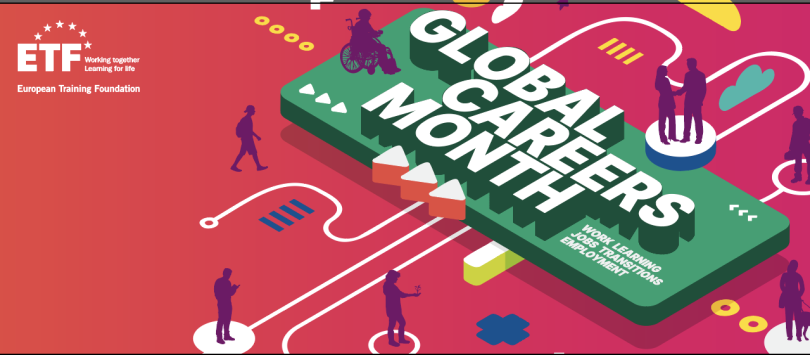
Professionalisation of career guidance practitioners: innovations from Eastern Europe and Central Asia
This month the ETF and other international agencies have organised the Global Careers Month. As part of the programme, agencies are promoting career development for both young people and adults.
The ‘Professionalisation of Career Guidance Practitioners’ in Eastern Europe and Central Asia was the focus of a livestream event on Tuesday 15 November. The event brought together practitioners from across Europe and Central Asia, and experts from international agencies.
Tibor Bors Borbély-Pecze, International Expert, author of the ETF’s review report on Armenia, Azerbaijan, Georgia and Ukraine, provided an overview of the changes in education, labour markets and career guidance in these countries as they moved towards an open-market economy.
‘Career guidance can be a bridge as a service by the state, schools, and the private sector so that the school-to-work transition is not only a single event in someone’s life. Societies have to be prepared for the open market, and there is a need for good-quality career guidance. There’s a lot of space for development in these countries, although a lot of professionalisation has been happening,’ he said.
Dispelling myths
Liana Amiraghyan, Career Specialist, Yerevan Regional State College N2, Armenia, dispelled the myth that career guidance is just for young people and a once-in-a-lifetime occurrence.
‘There are rapid changes in the workplace, and people need career guidance. There is often a skills mismatch with the knowledge they get (at school) and labour market demands,’ she said.
What has been key to improving overall career guidance has been adapting approaches to the needs of national and regional societies and working with the private sector on the importance of lifelong guidance and how it can benefit companies. Borbély-Pecze said this has required more than just translating career guidance to ensure the integration of knowledge across the board.
Case studies
Several inspiring cases from the region were presented. Haykuhi Gevorgyan of CareerLab, Armenia, talked about some of the best practices in the country, and how it has developed over the past decade. A key enabler in rolling out career guidance in all technical and vocational education and training (TVET) institutions has been effective cooperation between the ministries. ‘The impact on employment has been significant, but there are still many challenges in implementing career guidance,’ she said. Forecasting demand for professions and the labour market is just one of the challenges, with the country lacking a platform to gather and disseminate such information.
Ukraine develops parallel systems
Oleksandr Burov, Adviser-coordinator of the Ukrainian Association for Career Guidance and Educational Advising, gave an overview of career guidance developments over the past decade. However, since the Russian invasion, the approach has had to adapt.
Ukraine had adopted three parallel systems, one country-focused, a second for Ukrainians that have been displaced within the country or abroad, and the third a mixed approach to involve students that are studying the Ukrainian curriculum in another country.
‘There has been a blurring of the boundaries between the educational systems of different countries and Ukraine. A new task for Europe, the USA and other countries hosting Ukrainians is to support newcomers and not let the gifted and motivated be left behind. Re-training and re-skilling programmes for professions are important for the recovery of Ukraine,’ said Burov.
Uniform standards
Thea Siprashvili, a Georgian expert, in her overview of career guidance in the country, emphasised the importance of establishing uniform standards to develop programmes and ensure professionalism among career guidance practitioners. Valerii Voleanschi at the Platforma Centre for Policies, Initiatives and Research in Moldova, discussed the NGO’s activities in assisting refugees to find work. He emphasised the importance of developing language skills and professional training in certain fields.
Transferable skills
Beena Kuttiparambi, Adolescent Development Chief at UNICEF, in Tajikistan, said it was essential to take an integrated approach to career guidance, and for there to be a focus on transferable skills. In October, UNICEF released a report as part of its Learning to Earning programme, Unlocking the Power of Digital Technologies to Support 'Learning to Earning' for Displaced Youth.
Gundula Gwenn Hiller, at the University of Applied Labour Studies of the German Public Employment Services (HdBA) & NICE Foundation, which has a Network for Innovation in Career Guidance and Counselling in Europe, emphasised the value of peer learning among career guidance practitioners to ensure constant development.
‘Case studies are important for multiple perspectives, and for people to share their knowledge and experiences to bring about solutions,' she said.
EU4Youth
Jochen Schmidt, EU4Youth representative for the Eastern Partnership, discussed the importance of working with different stakeholders at the state and non-state level, as well as with institutions that work with the youth.
The EU4Youth initiative, launched in 2017, aims to foster the employability and active participation of young people in Eastern partner countries. This includes promoting networking and knowledge sharing, and involves the EU’s Youth Guarantee.
DARYA
Christine Hemschemeier at the ETF gave an overview of the activities and plans of the Dialogue and Action for Resourceful Youth in Central Asia (DARYA) programme. The five-year, ETF-implemented project is to launch in Astana on 22-23 November 2022 and aims to take forward reforms designed to help foster skills demanded by the market, including green, digital and entrepreneurial aptitudes.
‘It is the first EU-funded regional project to focus entirely on vocational education and training and skills development. It is similar to EU4Youth as it focuses on inclusiveness,’ said Hemschemeier. ‘We hope that over the next five years we will see new developments not just being discussed but actually implemented, both by individual countries and potentially through joint work among Central Asian countries.’
Did you like this article? If you would like to be notified when new content like this is published, subscribe to receive our email alerts.